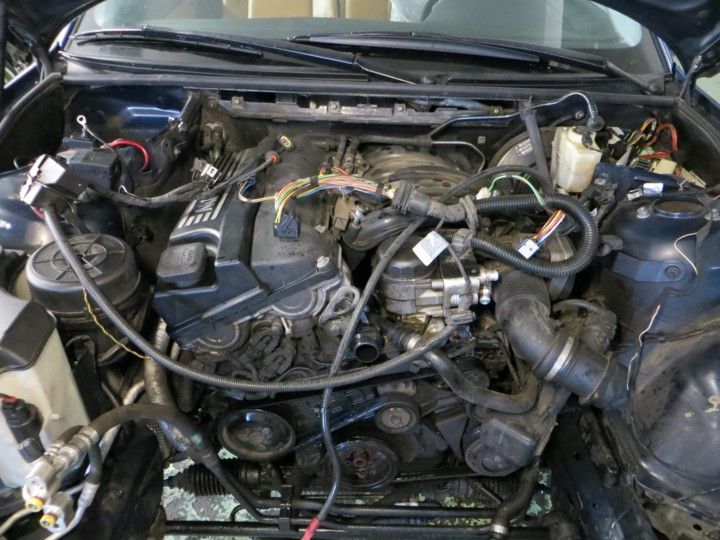BMW 318ti: A Comprehensive Overview to This Compact Giant
BMW 318ti: A Comprehensive Overview to This Compact Giant
Blog Article
Essential Considerations for Selecting the most effective Engine for Your Demands
In the realm of choosing the optimal engine to satisfy your needs, a number of crucial elements need careful factor to consider to ensure ideal performance and effectiveness. From the nuanced equilibrium in between power and efficiency to the often-overlooked elements of upkeep and service requirements, each facet plays a critical function in establishing the most ideal engine for your details requirements.
Power and Efficiency
When reviewing engines for optimum efficiency, it is critical to focus on both power result and effectiveness. Power result gauges the capacity of an engine to create power, which directly impacts its performance. A high power result is essential for demanding jobs such as sturdy applications or high-speed needs. It makes sure that the engine can deal with the work properly and effectively. Nevertheless, power alone is not sufficient; efficiency plays a considerable function in identifying the overall efficiency of an engine. Efficiency refers to how well the engine converts gas right into functional power. A a lot more reliable engine will deliver better mileage, lower discharges, and minimized operating expenses. Striking the right equilibrium between power output and performance is crucial to selecting an engine that satisfies your particular demands. It is necessary to think about elements such as the planned use of the engine, environmental influence, and long-term price implications when making this choice. By thoroughly evaluating both power and effectiveness, you can pick an engine that delivers optimal performance and meets your needs efficiently.
Fuel Efficiency and Economic Climate
In the world of engine selection, the consideration of fuel performance and economy holds critical relevance. Gas efficiency refers to the engine's capacity to transform fuel right into power with marginal waste, directly impacting operating expenses and environmental sustainability. bmw 318ti. When selecting an engine, evaluating its fuel economic climate is vital to establish lasting financial savings and environmental impact. Engines with higher gas effectiveness not just minimize gas expenditures yet additionally lower carbon exhausts, adding to a greener procedure.
Compatibility and Application
Thinking about the fuel effectiveness and economic climate of an engine, the next critical element to address is its compatibility and application within specific operational contexts. Compatibility describes exactly how well the engine incorporates with the general system or equipment it powers. It entails factors such as physical measurements, mounting choices, electric interfaces, and control systems. Making certain compatibility is necessary to stop concerns such as overheating, resonances, or power inequalities (bmw 318ti).
Various engines are made for particular purposes, whether it be industrial equipment, aquatic vessels, vehicles, or power generators. Recognizing the desired application permits for the choice of an engine that can provide the necessary power output, torque, and operational features.
Upkeep and Solution Requirements
Maintenance and solution requirements play a vital role in ensuring the durability and optimum efficiency of an engine. Regular maintenance is necessary to prevent break downs, expand the lifespan of the engine, and maintain its effectiveness. When selecting an engine, it is very important to consider the producer's suggested upkeep schedule and the availability of service facilities or qualified specialists.
Aspects such as the regularity of oil modifications, filter substitutes, and total assessments can dramatically influence the engine's efficiency. Some engines may call for more constant servicing based upon their layout and use, while others may have longer periods in between upkeep checks. It is essential to stick to these service demands to prevent pricey repair work and unanticipated downtime.
Price and Budget Plan Considerations
Budget restraints usually play a substantial function in the decision-making process when choosing an engine for a particular application. When thinking about the price and budget plan implications of click over here selecting an engine, it is important to analyze not only the first purchase cost but additionally the long-term expenditures linked with upkeep, gas usage, and possible upgrades or repair work. It is crucial to strike an equilibrium in between the upfront price of the engine and its total lifecycle expenses to make certain that the chosen engine stays monetarily sustainable throughout its functional life-span.
Elements such as gas dependability, performance, and durability can directly affect the complete cost of ownership of an engine. While a more expensive engine may have higher in advance expenses, it can potentially cause lower upkeep and gas expenditures gradually, hence supplying better value in the long run. In addition, thinking about the accessibility and price of extra parts, along with the ease of maintenance and solution, can help protect against unanticipated financial pressure in the future. By meticulously evaluating these cost and budget plan factors to consider, you can make an informed decision that straightens with your functional requirements and financial restrictions.
Final Thought

Gas efficiency refers to the engine's capability to transform gas into energy with minimal waste, straight influencing operating costs and ecological sustainability.Factors influencing gas efficiency include engine layout, combustion effectiveness, and general efficiency optimization. Additionally, choosing the proper gas kind and quality as recommended by the engine maker can better boost efficiency and extend engine life expectancy.
Engines with excellent serviceability features and easily offered components can lower upkeep prices and minimize the time the engine is out of operation - bmw 318ti. It is vital to strike an equilibrium in between the click here to read ahead of time cost of the engine and its general lifecycle expenses to make sure that the selected engine stays economically lasting throughout its functional life expectancy
Report this page